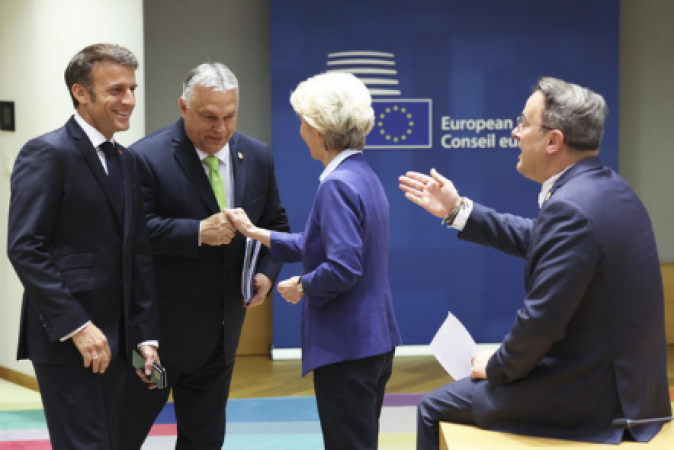
Brusells: Following their defeat earlier this month in a vote on a proposal to divide up the arrival of refugees among the 27 member states of the European Union, Poland and Hungary continued to obstruct progress as European Union leaders began a second day of negotiations on migration on Friday.
One of the biggest crises in the EU occurred in 2015 when well over 1 million migrants entered the continent, the majority of them refugees fleeing Syria. Some leaders claimed that Poland and Hungary appeared to be waging a war that was started years earlier. Others argued that the two simply cannot be allowed to violate EU regulations.
Speaking to reporters at the EU headquarters in Brussels, Estonian Prime Minister Kaja Kallas said, "My feeling was there's a lot of bitterness about the debates on migration from 2015." "If you just say no to everything and everybody else tries to compromise, that doesn't really work out."
Also Read: Lavrov: Ukraine's Zaporizhzhia Nuclear Plant Engaging in 'Dangerous Game
Hungary was "totally adamant," according to Slovenian Prime Minister Robert Golob, about having the subject completely dropped from the leaders' final summit communique. "Let's do it this way or that way wasn't the issue. We don't want to hear anything about migration mentioned at all, it was like.
Golob affirmed that Charles Michel, president of the European Council, who is presiding over the summit, is likely to issue a separate chairman's statement that is not subject to the approval of member nations.
Also Read: Bishop claims that some Britons are only concerned with "brown" immigrants
An agreement on a strategy to divide liability for migrants entering Europe without authorization was sealed earlier this month by EU nations, marking a significant advancement in the reform of their asylum laws.
The agreement struck a balance between other members' obligations to provide support, whether in the form of financial aid or by hosting refugees, and those of the countries where the majority of migrants arrive to process and lodge them. Countries that refuse to accept migrants could pay an alternative amount of 20,000 euros ($21,400) per person.
With a qualified majority vote of roughly two thirds, the agreement was finalised. Only Hungary and Poland abstained. Their goal at the summit has been to contest the legitimacy of that choice legally.
Viktor Orban, the prime minister of Hungary, declared on state radio that he would keep opposing new immigration laws until an agreement was reached and that they posed a serious threat to his nation.
Any rule must be unanimously approved by all parties in order for us to accept it, Orban said on Friday.
He continued, "They want us to create immigrant ghettos in Hungary. "We say outright that we do not intend to implement these decisions."
According to Luxembourg's Prime Minister Xavier Bettel, yielding to such demands would create a risky precedent.
He informed reporters that "Poland and Hungary do not agree with the (EU) treaty." We can't go back and say, "Okay, we don't agree," because then everyone would see the list of all the decisions we've made in the previous ten years.
Prior to the meeting, Poland's prime minister insisted that his country would not be compelled to abide by the migration policies of the European Union and vowed to veto any proposal that might compel nations to accept refugees.
"Europe is the target of an attack. The borders of Europe lack security. Mateusz Morawiecki, Poland's prime minister, declared in a video statement that the safety of the people living on our continent was in jeopardy. He promised to put forth "a plan for secure borders" to the authorities.
Morawiecki stated that his "plan is clear — 'no' to forced relocation of immigrants, 'no' to violations of individual states' veto rights, 'no' to violations of the principle of freedom, the principle of states' sole authority over their own affairs, and 'no' to penalties imposed by Brussels on states.
The Czech Republic, Poland, and Hungary all refused to comply with hastily imposed migrant quotas in 2015. In 2020, the EU's highest court declared that they had broken the bloc's laws.
Also Read: Putin claims that desecration of the Qur'an is a crime in Russia while visiting Dagestan
Unauthorised entry into the EU is being attempted by more and more people. Frontex, a border and coast guard organisation, reported that from January to May, more than 50,300 attempts were made. It's the highest since 2017 and more than double what it was during the same period last year. But compared to Turkey, Lebanon, or Jordan, the number of migrants entering Europe is enormous.
Poland is hosting about a million Ukrainian refugees at the same time.
Hungary and Poland's attempts to have the laws changed are unlikely to be successful, but their anti-immigrant stance, which has the support of other members like Austria, Denmark, and Sweden, has ensured that the EU's policies are centred on keeping people out and swiftly deporting those who are not allowed to stay.